More clever, less PC title: “I Took My Canon To London And I Shot The Place Up”
Length of Stay: 3 days - January 2012
Things I Wish I Had: A blue/gold polarizer filter, more money, and an invisibility cloak
I arrived to London Heathrow airport at 7:30am and found my way onto the subway (or the Underground if you’re in London) on my way to my hotel (or in a general eastward direction). With my backpack, my rolling suitcase, and my camera bag in my hands and my American money, a credit card and a shitty map in my pocket, I arrived at Green Park – it was the only stop I could identify on my map. It was astounding to me how many people on that subway did not speak English. Luckily the guy in the information booth was a British national. “You a lost American?” he said. I kind of chuckled and affirmed his question. I told him the address I needed to get to, and he told me to get on the Victoria train for one stop (to Victoria station). It was simple enough.
When I walked outside it was pouring rain… and the wind was probably moving at 100 mph. Truly, this was a new definition to “raining sideways.” I had a ticket to the Tower of London that was only good for that day (the 4th of Jan 2012) so I dug my umbrella out of my bag hoping it would protect me from the rain when it wasn’t blowing inside-out from the wind. The British man had circled where I was on my map and drawn me a line to where I was going. One step two step.
I used to complain about whoever named the city streets in San Diego. I will never do that again. Most of London’s streets were literally only about a block long until they got a new name. It made me wonder how they didn’t run out of names – at least in San Diego we have 1st Street to whatever the highest number is…. And A Street to whatever the highest letter is going the other way. Here in London we had a million different names for the same street going the same direction. If a street curved it would get renamed sometimes, but not other times.
The good thing about the rain, though, was that it made for some beautiful clouds (when I wasn’t freezing cold) if I could fight through being cold. My hands don’t work well in the cold because of a nerve condition, so I had to use camera on tripod and a remote even for the shortest exposures. Aw well. The landmark I used to turn onto the street of my hotel was Coroner’s Court, which had a taxi parking depot and an old red payphone (which they still use).
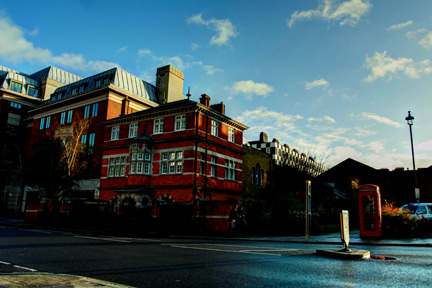
I got to the hotel (which by the way was located on a SQUARE street around a park) at around noon after getting lost a few times. I was totally drenched, and so were my bags. I checked my suitcase and backpack into the hotel and grabbed my camera, off to the Tower of London again via the subway. This time the stop was literally right outside the London Tower, so I was happy about that. It was still pouring though, so I decided to wait a few minutes for the wind to settle down again before walking to the entrance. Luckily it was mostly an inside venture. The Tower of London is a castle from the Medieval Era and a great dose of London’s history. There were a lot of people inside, so I wasn’t able to capture a really good photo of the inside of the castle. It was about what you would expect a castle to be, though. There were several employees that acted and dressed like the inhabitants of the castle (for the children, of which I am obviously one). There was a little bit of literature about the tower that housed prisoners, but it was a hair sugar-coated, presumably because the Tower of London was very child-friendly. They did show the rack and several other devices used for torturing the prisoners. The sky outside the Tower was a very photogenic bright white color, but right as I was getting ready to leave, the clouds got even thicker and I was able to get this fog shot:
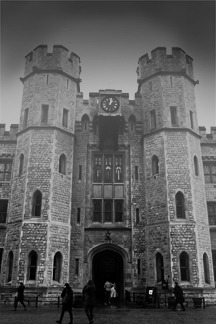
Later in my trip, I went to the Clink Prison Museum, where I learned the version of the history that gave me nightmares, and I’m wondering why I’ve never read about Britain in the 15th and 16th Centuries in any US history class I’ve ever taken. It is our history too, as this was occurring right up until our country’s founding, and the museum even gave the perspective that many went to the New World to escape to a land of promise (and then in parentheses: and some were condemned to live a life in the southern land of Australia). I learned about Bloody Mary and Elizabeth and the fight for the throne between the Protestants and Catholics. People could be imprisoned and tortured in Clink for things as simple as owing money, and people were supposed to pay for their stay there (as in: they had to pay rent to the prison that was torturing them). If a woman were imprisoned in Clink Prison, her children were forced to go live there with her. Prisoners could leave the Clink if they wanted, but they had to carry around the ball and chain with them outside. I seriously have nightmares now, but it was good to find some true and honest history.
In London it started to get dark by 3:30, and the clouds started to change color at around 2:45. Here’s a shot of the entrance to the Church of England branch looking up at the sky.
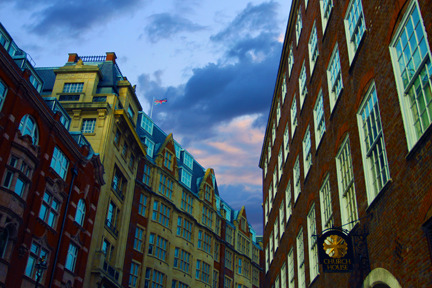
I was expecting my low-budget London motel to be similar to a low-budget American hotel or Motel 6. Wrong. The Wellington Hotel only cost me $77 a night (so probably about 50 Pounds), and it had a twin bed, a wall locker, a desk, a sink, and a TV on the desk. There was a shared bathroom for the whole floor. It reminded me a lot of a military barracks for some reason, and I actually went back outside at one point to make sure it said “hotel” and not “over-priced hostel.” Oh yea I forgot to mention the heater didn’t work, which was a big deal considering the winter temperatures in London and my nerve condition. Although the room was small, the bed was comfortable and the staff was helpful. They even gave me a more detailed map of London and a subway map.
London has more coffee shops than any American town I’ve ever been to, and the best part about that is this: I saw 49 different coffee shops before I saw a single Starbucks. That’s reason enough for me to move to England, as Starbucks has always tasted burned to me. I tried a lot of coffee shops, but my favorite was definitely Caffe Nero. I also found the food to be interesting. It took me a while to find a place that served Fish and Chips, which I wanted to have since I was in the UK for heaven’s sake. I suppose I walked down a sort of international food street as I passed upscale Italian, Spanish, French, Greek, Mediterranean, and multiple coffee places before there was a Fish and Chips place at the end of the street. I snickered when I saw the “American food” sign and the restaurant was a Subway. At least it wasn’t McDonald’s.
In my second day in London, I found myself at Westminster Abbey and Big Ben. I walked around the complex and noticed two protests taking place in London streets. The first was right across from Big Ben – people were camped there protesting to get troops out of Afghanistan. Suddenly I felt like I was home (snicker.) The United States seems to take a lot of criticism for being the war-monger nation in the West, the imperialist invaders of the modern age (because of the numerous bases on foreign soil), so it was interesting to me to see that our allies also got similar uproars in their homes. I asked one of the law enforcement officers how long they’d been out there and whether or not it was legal for them to sleep in the streets, as they were sleeping in tents. He said it was legal for now and that they were in the process of passing a law prohibiting camping in the streets. I then learned that those particular protesters had been there for a few years.
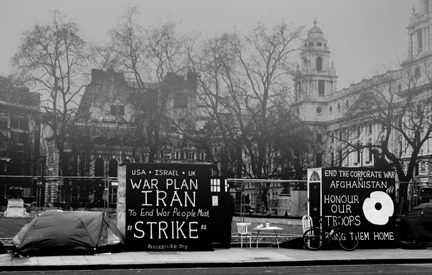
Down the street a little further it was not an occupy-style sleep-in protest, but a gathering of African Brits (it’s politically-correct to refer to people as black or white in the UK) protesting the UK’s presence in both Iraq and Libya but neglect of presence in Congo.
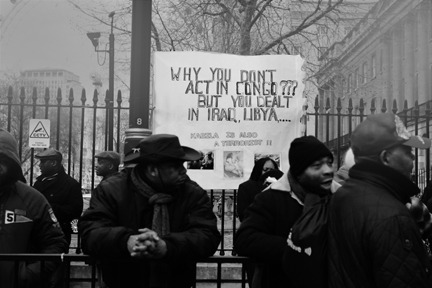
More than the protests, what I noticed was the calm demeanor of the law enforcement officers – and their acknowledgement that “everyone has a right to protest” and protection of their citizens’ rights. One of the police officers protecting the Congo protestors (a white guy) had tears in his eyes and asked me to show him my photos, clarifying that it was legal to take them but he just wanted to see them. My question of the legality alerted him that I was not British, and when he found out I was an American, he asked me about the Occupy protests. Apparently the gassing that took place in Oakland did not make international news (or at least not British news). He did not know that the police men used nerve gas on US citizens protesting in the streets and was appalled that it happened to an elderly lady and a veteran. British cops do not carry firearms or any sort of stick like US cops. They don’t wear uniforms or display rank – they wear bright yellow vests. I saw some of them riding in cars, and some riding horses. It seems that unlike the US cops that I have now acquired a mistrust toward, British cops really do serve and protect their people. However it seems to be relatively recent that London has gotten over a sort of problem with racism according to the news, but I’m not sure how credible that is as racism is easy to claim for every single inequity.
Down the street from the Congo protest was a memorial to the Women of World War II, displayed in the middle of the street so that everyone had to drive past it. It makes me want to go pick up a British history textbook and read about World War II from their perspective. The only perspective I’ve ever heard is the American side, and then I got the other countries when it was relevant.
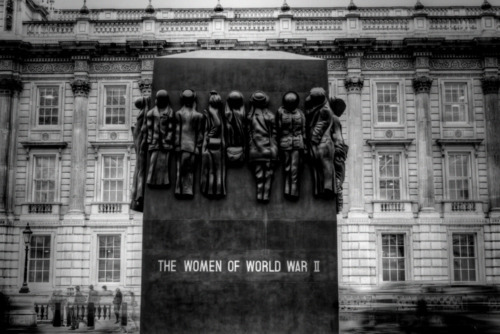
The memorial was inspired by the woman spy, Eileen Nearne, who sadly is recently deceased. The poor lady didn’t have any living relatives and died alone, but she had an exciting life. She inspires me because she was a woman linguist. She spoke fluent French and was sent by the British forces to work as a secret radio operator. She was caught using her radio at age 23, imprisoned, and tortured. Despite their abuse and torture, she wouldn’t relinquish her story of being a little shop girl who had no knowledge of secret war tactics. She was released by the French but later captured by the Germans. She escaped the internment camp, but was captured again. She was then able to use her language skills to convince them she was innocent and she was released. This is a detailed British article about her life and death if you want to read more: http://www.dailymail.co.uk/news/article-1311699/Tragedy-WWII-spy-Eileen-Nearne-escaped-Gestapo-died-alone.html
Every 50 meters inside Westminster Abbey houses a sign “no photography, please” and given the video cameras around in the area, monitoring peoples’ compliance with the law, I didn’t chance that one. I even went to the press office and asked permission to take photos, and they said it was not possible. They offered to sell me photos though. Big Ben was not open to the public, and there were about six cops outside. However, that didn’t stop me from taking photos outside either of the buildings and inside Westminster Abbey where there was not a sign with video surveillance.
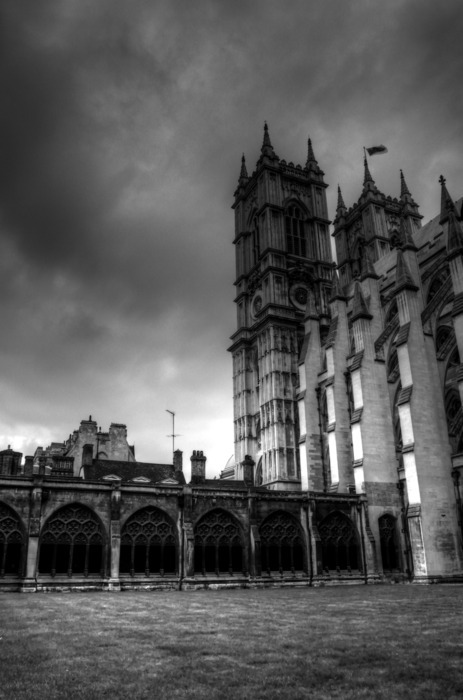
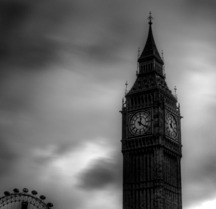
I decided I wanted to hear what was on British news. I was actually surprised to hear what they had to say about the US Iowa caucuses. They were very interested in them, and it seems that Britain is in favor of getting Obama out of office – which surprises me from a socialist country. I suppose that has to do with the state of the US economy and how much the world relies on the dollar (by the way, one pound is worth $1.55). I was very interested to hear the statement, about Romney, “Watch that man, as he could soon become the most powerful man in the world. He could become the leader of the only world superpower.” First of all, it never dawned on me to think that the US president could be the “most powerful man in the world” but I suppose that could be an accurate statement given how stout the US military is, and how much we as a country like to flex those muscles – and how much influence our currency has on the rest of the world. I was also surprised to hear the US referred to as “the only” superpower. Honestly, I consider the UK to be a superpower along with Japan, China, and the EU. I’m surprised the UK doesn’t regard itself as such. So, UK… if someone attacked you, what would happen? See… you’re a superpower.
On a closing note, it was nice to see that the British, like Americans, were a very patriotic group of people. Every block had a flag flying high on a building top. Americans are often criticized for their “worship” of their colors, but we don’t fly as many flags as the British (at least in London) seem to. Go for it, UK! Be proud of what your flag stands for! (Side note: as a general rule, I HAAAATTEE selective color in photos, but every once in a while I find myself breaking even my own rules about photography when appropriate.)
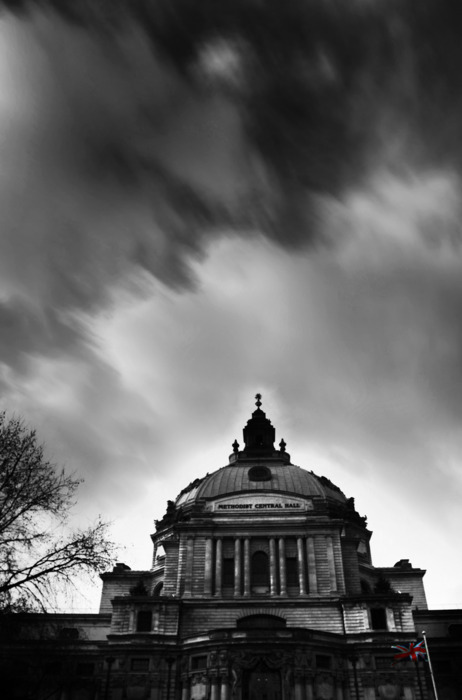
This comment has been removed by a blog administrator.
ReplyDelete